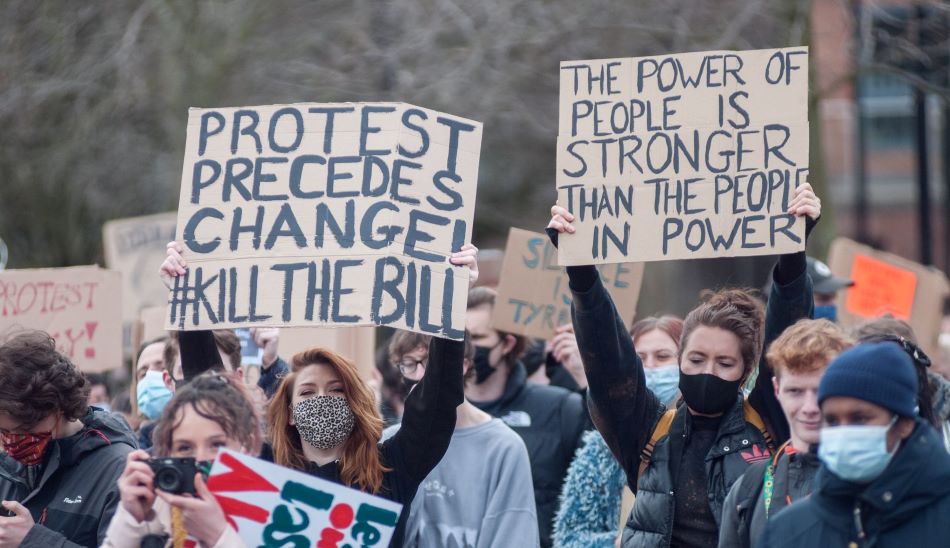Defend the right to protest

Photo credit Tim Dennell
Update - find out more about new police powers under the Public Order Act 2023 and the Police, Crime, Sentencing and Courts Act 2022, and how they could affect you when organising or attending a protest in NetPol's Know Your Rights resources.
The Police, Crime, Sentencing and Courts Act 2022 was brought in with the intention of deterring protest and giving sweeping and arbitrary powers to the Home Secretary and police to determine what is acceptable.
Liberty provides a detailed explanation of the new powers under the Act and how they may affect protesters, with more context provided by NetPol.
- It gives new powers to police to restrict static protests, which were previously only available to restrict protest marches.
- It gives the police the power to impose conditions on one-person protests,
- Previously, the Public Order Act 1986 said a protester may face arrest if they knowingly fail to comply with conditions imposed on a protest. The Police, Crime, Sentencing and Courts Act amends this so it is an offence if they fail to comply and know or 'ought to know' that the condition has been imposed.
- The maximum penalty for obstruction of the highway has increased from a fine to up to six months imprisonment.
- It replaces the current common law offence of public nuisance with a new statutory offence of causing “serious distress, serious annoyance, serious inconvenience or serious loss of amenity”. This would result in a maximum sentence if tried in a Magistrates Court of six months in prison and a fine and for more serious cases tried in a Crown Court, of up to 10 years in prison.
- The Act extends the “controlled area” around Parliament where particular protest restrictions already apply and adds a new offence of obstructing vehicles from entering or exiting this area. The right to protest outside the seat of government is particularly important.
The Act also threatens to criminalise the way of life of Gypsy, Romany and Travellers, who increasingly lack legal stopping places.
As Home Secretary, Priti Patel attempted to insert even more draconian measures into the Police, Crime, Sentencing and Courts Bill as it moved from the House of Commons to the House of Lords, but the Lords successfully rejected these.
However these measures were reintroduced in the Public Order Bill, which is expected to become law soon.
Serious Disruption Prevention Orders: These orders effectively ban certain individuals from participating in protests on the basis that they have either been convicted on two prior occasions of protest-related crimes, or have caused 'serious disruption' (without conviction) on two prior occasions. This gives total discretion to the authorities as to how they define 'serious disruption'. SDPOs restrict the exercise of a fundamental right of peaceful assembly. They could involve restricting online activity or even electronic tagging.
A new offence of ‘locking on’: attaching yourself, another person or an object to anything else. ‘Attach’ isn’t defined, so could potentially mean anything from using superglue to weighing down balloons to linking arms.
Expanding stop and search: to allow police to stop and search people and vehicles (either with or without grounds for suspicion) for any items that could be used to commit the new offences (essentially any potentially protest-related item), and then confiscate these.
This legislation comes alongside other measures restricting fundamental rights - attacks on the right to strike for workers in key services, and a 'Bill of Rights' which would repeal the Human Rights Act 1998 if it is continued.


